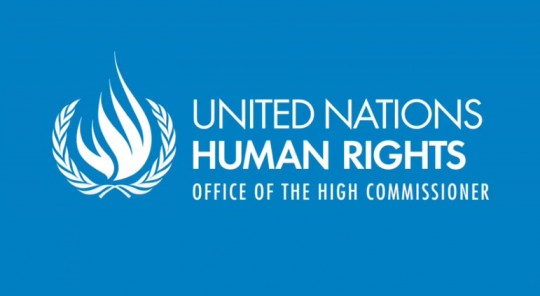UN agencies condemn violence against Mexican peace activists
UN agencies condemn violence against Mexican peace activists
Two United Nations agencies have strongly condemned the recent murder of a Mexican peace activist and the attempted killing of the chief of a women’s rights organization in the same country and called on the Government to investigate and prosecute those responsible.
Nepomuceno Moreno Núñez, a member of the Peace with Justice and Dignity Movement, was murdered on 28 November in the northern state of Sonora. He joined the movement after the disappearance of his son in July last year, demanding an investigation and punishment of the perpetrators.
Two months ago, during an encounter of the movement with Mexico’s President Felipe Calderón, he revealed he was under a lot of pressure and turned in all the documents related to his son’s disappearance.
Norma Andrade, the co-president of the non-governmental organization (NGO) “Nuestras Hijas de Regreso a Casa” (Our Daughters Come Home) in Ciudad Juárez, was severely injured by a gunshot on 2 December.
Ms. Andrade’s daughter was murdered in 2001. Since then, she has been defending women’s rights, demanding justice for the hundreds of women have been murdered in the state of Chihuahua over the past decade.
Javier Hernández Valencia, representative for the UN Office of the High Commissioner for Human Rights (OHCHR) in Mexico, called for authorities to implement mechanisms that would protect human rights defenders in the country.
“As time passes the risks that human rights defenders and victims of human rights violations increase drastically,” he said in a statement issued yesterday.
A representative for the UN Entity for Gender Equality and the Empowerment of Women (UN Women), Ana Güezmes, stressed the “necessity to strengthen the right to justice, and to guarantee the rectifying the damage suffered by victims and their families, as well as deploying more efficient actions to prevent, sanction and eradicate impunity and violence, in particular violence against women.”
Both officials reiterated the need for the Mexican Government to establish dialogue with NGOs to create a national mechanism that can guarantee the security of those individuals that dedicate their lives to the promotion and defence of human rights.
###
About Office of the United Nations High Commissioner for Human Rights (OHCHR)
Who we are
The Office of the United Nations High Commissioner for Human Rights (OHCHR) represents the world’s commitment to universal ideals of human dignity. We have a unique mandate from the international community to promote and protect all human rights.
Leadership
The High Commissioner for Human Rights is the principal human rights official of the United Nations. The High Commissioner heads OHCHR and spearheads the United Nations’ human rights efforts. We offer leadership, work objectively, educate and take action to empower individuals and assist States in upholding human rights. We are a part of the United Nations Secretariat with our headquarters in Geneva.
The Office’s priorities are set out in two key strategic documents: the OHCHR Plan of Action and its Strategic Management Plan 2010-2011. These priorities include greater country engagement, working closely with our partners at the country and local levels, in order to ensure that international human rights standards are implemented on the ground; a stronger leadership role for the High Commissioner; and closer partnerships with civil society and United Nations agencies.
United Nations human rights system
We also support the work of the United Nations human rights mechanisms, such as the Human Rights Council and the core treaty bodies set up for monitoring State Parties’ compliance with international human rights treaties, promote the right to development, coordinate United Nations human rights education and public information activities, and strengthens human rights across the United Nations system. We work to ensure the enforcement of universally recognized human rights norms, including through promoting both the universal ratification and implementation of the major human rights treaties and respect for the rule of law.
Our structure
We have an office at United Nations headquarters in New York and offices in numerous countries and regions. In addition to the Executive Office of the High Commissioner and a number of units that report to the Deputy High Commissioner, OHCHR has two major divisions and four branches.
To implement our comprehensive mandate, we employ more than 850 staff (last update in April 2007), based in Geneva and New York and in 11 country offices and seven regional offices around the world, including a workforce of some 240 international human rights officers serving in UN peace missions. We are funded from the United Nations regular budget and from voluntary contributions from Member States, intergovernmental organizations, foundations and individuals.
###
> United Nations (UN).
 The United Nations was established on 24 October 1945 by 51 countries committed to preserving peace through international cooperation and collective security. Today, nearly every nation in the world belongs to the UN: membership totals 192 countries.
The United Nations was established on 24 October 1945 by 51 countries committed to preserving peace through international cooperation and collective security. Today, nearly every nation in the world belongs to the UN: membership totals 192 countries.
When States become Members of the United Nations, they agree to accept the obligations of the UN Charter, an international treaty that sets out basic principles of international relations. According to the Charter, the UN has four purposes:
- to maintain international peace and security;
- to develop friendly relations among nations;
- to cooperate in solving international problems and in promoting respect for human rights;
- and to be a centre for harmonizing the actions of nations.
###
* The above story is adapted from materials provided by United Nations (UN)
** More information at United Nations (UN)




















